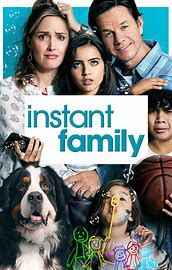Film Review

Instant Family-Reality or Fiction?- How our young people felt about the portrayal.
During lockdown our youth council has been discussing how adoption is portrayed in the media – in films, books and TV shows. How adoption is portrayed in the media is so important because it’s where the general public get most of their information from about adoption – unless they have a personal connection to adoption and as adoptees we feel we are best placed to challenge anything we think is misleading, confusing or potentially harmful. So we thought we’d review one of the most recent popular films ‘Instant family’
It is described as ‘Idealistic couple Ellie and Pete find themselves overwhelmed when they open up their home to foster teenager Lizzy and her two younger siblings, Juan and Lita. With the help of fellow foster parents and agency workers they learn to navigate the joys and pitfalls of parenting to become a modern family’. This gives it a rather rosy, light hearted feel and after all it is a comedy so there was only so far the film could go into what adoption can really look and feel like for those involved and this was something Adopteens members definitely picked up and commented as follows: ‘It didn’t show the real extent of what can happen in families and doesn’t show how hard it is for children and the sadness they can feel’. But the group felt it did manage to show that adoption can be ‘complicated and that children come with their own history and feelings around how important birth parents are to them, as well as how that differs between siblings’.
They also felt the film picked up on ‘how each sibling can feel their experiences differently and each character had their own way of showing this with Lizzy often being angry & defiant opposed to Juan who was highly anxious and scared (as well as very clumsy) a lot of the time’
We asked how they felt the professionals were portrayed in the film with one asking ‘are they really that honest with parents and straight to the point?’ They also felt in real life ‘social workers aren’t as funny (sorry social workers) and take things more seriously, they wouldn’t just shrug it off or laugh, they would do something about it’
When we discussed the adoption day scenes the group shared ‘how harmful they thought those days could be for parents and children, for example if people made instant connections and then those relationships couldn’t continue.’ There was also some huge concerns about safeguarding of the children so we talked about how the film didn’t portray the adoption days accurately, and that there is usually far more involvement from professionals, with safeguards in place and not in an open park, but still there no escaping the fact that it felt like ‘selling children’ . One member talked about how she was matched with her parents in contrast to the film
‘My parents were offered a magazine called ‘Be My Parent’ which had loads of pictures and captions about various children all looking for a family. However, they felt this was too pick and choose and really disliked the idea of playing God. Instead their social worker said ‘I have a child in mind for you’ and showed them a basic file about me. This was partly down to my parents having a really good bond with their social worker, so over a few weeks she could think what child may be a good match with them. This has always seemed such a nicer way to match and more personal, however it relies on that connection and time with the social worker to make the link.’
We asked the group members what resonated with them the most about the film and they responded with a wide range of answers:
‘That the parents are trying so hard not to get it wrong that they get it wrong because they are overthinking it’
‘How the grandparents judged the parents for wanting to adopt at first and then they inspired others to adopt’
‘The importance of keeping that sibling connection. How it is their identity and the only thing that isn’t lost as they go through the care system because they still have each other’
‘When the little girl was screaming in the shop and came out with doll, parents trying so hard not to give in to the behaviour ’
‘The hairbrush scene, when the parent thought they had done something lovely and couldn’t understand why she had thrown it in the toilet’
Overall it wasn’t just a film about adoption. The group felt that lots of families that are made up in many different ways such as families with step children, or those where grandparents or other family members are guardians/ parents, or those born via surrogacy or donor could also relate to the film. “Not because your adopted, but because it is showing how different families come together, and about how people work together through their differences’
It ultimately ‘Showed how hard it can be to be human, that doing really hard things and commit to doing something is not easy and it was positive that they showed the reality of how, at times, we want to run away, but that more often than not we stick with it’. And they are really glad they stuck with it because they all agreed it definitely wouldn’t have been a comedy if they hadn’t!
